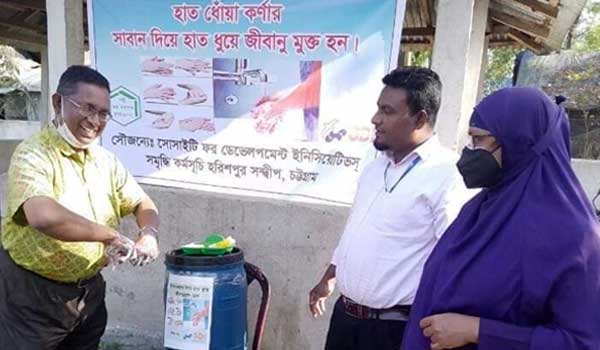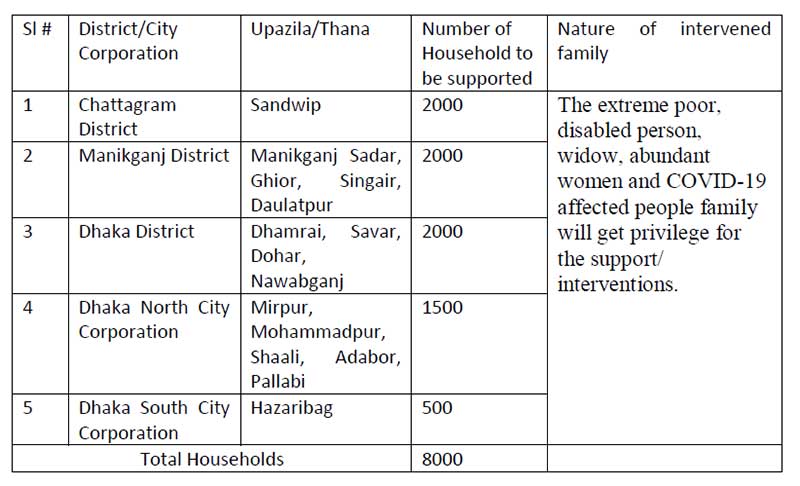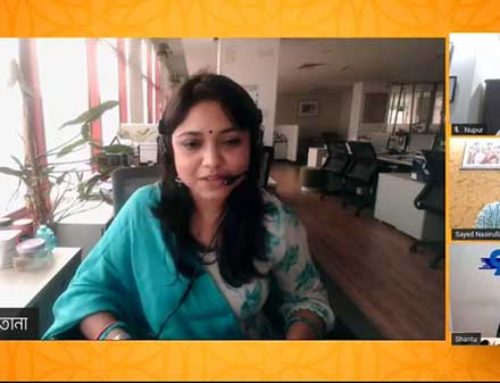Introduction of the organisation
Establishment: SDI was established in 1993 by a group of like-minded self-motivated development workers who were imbibed with the zeal to address the social maladies with a vision of realizing the human potential of the disadvantaged and powerless, alienated from the social, economic and institutional resources. SDI is a platform which has drawn NGO professionals who have adopted social development as a life time mission. The rich and diverse experience of the initiators is its unique asset.
SDI’s Creed: “Development that meets the needs of the present without compromising the ability of future generations to meet their own needs”
SDI’s Mission: The initiative or the agenda is to trigger a self-empowerment process whereby the poor and powerless can take charge of their own self-actualization agenda and empowering people for participation in the decision making process effecting their own lives.
Legal Status: SDI is a nonprofit social development Enterprise organization Registered with (1) Social Service Department. GoB, (2) NGO affairs Bureau, (3) Registrar of Joint Stock Company and (4) Registrar with Micro credit Regulatory Authority.SDI is eligible to receive external grants and also for operation of Micro credit, Micro enterprise and other development programs with local and external grant and credit fund)
Management Structure of the Organization: The highest body of the organization is the General Body (GB) consisting of 31 members. The General Body elects an Executive Committee (EC) consisting of 7 members for a three-year period. The GB and the EC are headed by the Chairman. On the EC, apart from the Chairman, there is a Vice Chairman, an Assistant Secretary and a treasurer. The Executive Director of the SDI acts as the Member Secretary of the organization. The EC is accountable to the GB. The Executive Director in turn is accountable to the EC. For day to day running of the organization, a Deputy Executive Director assists the Executive Director.
Annual General Meeting (AGM): The general body members of SDI holds at least one annual meeting (AGM) in a year. If necessary more meeting are held.
Executive Committee (EC) Meeting: Usually quarterly EC Meeting held. If necessary more meeting may be held.
Coordination Meetings (Regional, Central): SDI hold regular periodic coordination meetings at its Regional offices and Annual Coordination meeting is held at SDIs central Office.
REGIONAL /AREA/BRANCH OFFICES AND LOCATIONS: SDI had been operating 12
Regional Office or 70 Branch Offices and 3 project offices.

INSTITUTIONAL STRENGTH
SDI’S CORE STRATEGY: Investing more in women directly to reduce poverty through substantial economic and social pay off is the core strategy pursued by SDI. Empowerment of rural poor and hard to reach poor specially women and fringe communities by way of creation of jobs and sustainable livelihood and access to credit without collateral.
SDI pursues a sustainable human development policy, which is pro-poor, pro-nature, pro-jobs and pro-women. SDI aims at alleviation of poverty and empowerment of the poor in more operational terms such as access to institutional supports and facilities (for credit, technical, health, and education services) and concurrent fostering of local institutions which fights against threat to human rights, political rights and threatens environment.
- Self directed development and ultimate ownership of the initiatives by the people themselves.
- To strengthen the capacity of its object population for sustainable development and serve as a synergic resources to achieve it.
- To focus its resources on a series of objectives central to sustainable human development
- Facilitation of sustainable livelihood enhancing social conditions for rural women.
- Protection, promotion and regeneration of environment
- Improving access to health care and health education for practice of hygiene and behavior changes.
- RIGHTS based approach Advocacy and social mobilization for human and children’s right.
- Improving Humanitarian Capacity Building.
- Technology support for sprit up income.
Gender Policy:
SDI is a gender sensitive organization. In this context the policy and commitment of SDI is both consistent with Beijing Plus declaration to fight all forms of discrimination against women.
Child rights Policy:
SDI has adopted Childs Rights Policy in compliance with the UN as well as the policy adopted by the Govt. of Bangldesh
Disability Policy :
SDI has adopted its policy which closely follows the policy OXFAM UKs Bangladesh has formulated and circulated to its partners.
Zero Tolerance Policy:
In case misdemeanor or making aspersions to women on the ground of gender is considered a grave breach of discipline and comes under the policy of zero tolerance pursued by SDI
Pro hard core poor policy:
To outreach the bottom rung of the poor (termed hardcore poor), SDI had developed its own strategy of outreaching these people. Initially to address the HCP niche with interventions for alleviating their poverty to threshold level and then inducting into the existing development intervention scheme.
Complaint Mechanism:
At the time of issuing of letter of appointment each employee is given ToC of employment , which includes the complaint mechanism and its different stages. It also gives the direct phone number of the Executive Director as the last resort for a complainant.
Networking:
SDI is members of the following National and International networks and Partners
National Networks:
Credit and Development Forum (CDF), NGO Forum, Federation of NGOs in Bangladesh (FNB), Coastal Fisher folks Community Network (COFCON), Disaster Forum. Centre for Sustainable Rural Livelihood (CSRL),WECAN,NARI FORUM, NIRAPAD, Citizen’s Platform for SDGs Bangladesh.
International Networks:
International Institution of Rural Reconstruction (IIRR) Philippines, Asia Pacific Region Micro credit Summit Meeting of Council (APRMS), Asian Resource Foundation (ARF), Thailand, International Union of Anthropological and Ethnological Sciences(IUAES).
Partners:
Government of Bangladesh PalliKormo-Sohayak Foundation (PKSF), Oxfam-GB, GiZ Germany, Bangladesh Bank (BB), DCC/ UPPR/ UNDP, NGO Forum, Bank Asia Ltd, Oxfam International, Gov. of Netherlands-IFAD, EU , South East Bank Ltd., MTBL,National Bank Ltd., Japan Grant.

 Programmatic interventions in response to COVID-19
Programmatic interventions in response to COVID-19
Currently SDI stopped all its regular activities/program for the cause of Govt. General Vacation but observed the situation gravely. SDI initiated response by establishing Hand wash points at different public places, distribution of awareness building leaflet and by erecting banner in the working area. Notable that in the meantime SDI initiated small scale response work at Dhamrai Upazila and Dhaka Rayer Bazar area: SDI has disbursed 200+ food package ( Rice-5 kg, plus-500 gm oil- half Lrt., salt-500 gm, Onion-1 kg and potato-2 kg) among daily wage earner-manual small transport puller at Rayar Bazar area, Dhaka and Dhamrai Upazila, Dhaka. It is not for show up but for encouraging people to do something in this vulnerable situation. SDI realize that media people role is very important to get daily update news and to public awareness building. So society is need to do something for them to ensure their safety. Regarding this SDI awarded simple token; hand sanitizer, hand gloves, masks among 50+ reporters in Dhamrai.
 Future outlook and recommendations
Future outlook and recommendations
- We have a plan to do response work for the vulnerable people of COVID-19 situation along with our regular activities after the emergency/lockdown period.
- We are pleased to express our interest and willingness to do response work for the vulnerable people of COVID-19 situation. The response will be a partnership lead response with the financial and technical support from Donors and SDI own fund as well. Response budget will be prepared with partnership modalities. Note that our proposed intervention should be aligned with the WHO and Government instructions as well as the need of the communities at this moment.
- Our proposed intervention/ initiatives/ activities:
After the end of Govt. declared general holiday the household identification survey work will be conducted by the SDI existing staffs. The extreme poor, disabled person, widow, abundant women and COVID-19 affected people family will get privilege for the support/interventions. The selected households will be verified/endorsed by the respective government authorities. Then support will provide to the selected participants. The details/muster role will preserve properly. SDI would like to provide cash support to the participants by using BKASH App or any other appropriate Apps, because the support recipients can use cash money with their own plan/choice/necessities, and it is very much convenient for them. A completion report of providing and utilization of support will provide to the Gov. Line Departments and Partners.
The Location where we want to work:







